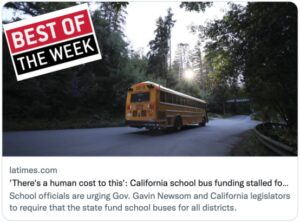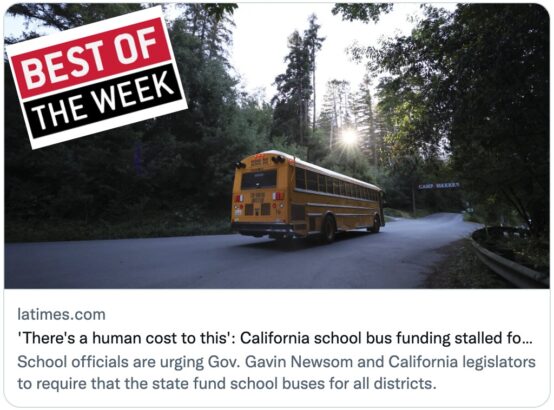
🏆 BEST: The best story of the week is California is richer than ever. Why is it last in the nation for school bus access? by Mackenzie Mays in the LA Times. Mays looks at a facet of schools that is rarely focused on, noting that school buses are a critical element of school attendance. Just 9% of California students take the bus to school, the lowest of any state and far below the 33% national average. That means that more than two-thirds of California’s students are driven to school each day. Schools may be open again, but without bus transportation some kids don’t show up — especially as gas prices rise. “That school bus is a lifeline,” said one superintendent. But schools in California aren’t required to provide buses, and the state hasn’t increased the amount it spends on buses since 1981. This is a great example of the many ways that schools impact students’ lives. This is also a regional story with strong national appeal.
🏆 RUNNER-UP: This week’s runner-up is What Chicago schools are like with fewer police officers by Nader Issa and Sarah Karp in the Chicago Sun-Times and WBEZ. The story is actually from late last week, but it’s an important and timely story nonetheless. Over the past two years, Chicago Public Schools has reduced its payment to the police department by two-thirds, part of “a complicated, emotional, and messy effort to change the response to student behavior from punitive to restorative.” So what has the change wrought? Fewer calls to police from schools. A district-wide change in mindset about what so-called “bad behavior” means — and warrants. But also an increase in suspensions. Reducing school police is not a perfect solution, and the picture is messy and complicated. This is a great example of reporters following up to see how policy changes affect kids and schools — and capturing the nuance of the experiment rather than trying to oversimplify..
BONUS STORIES:
🏆 After Steering Mississippi’s Unlikely Learning Miracle, Carey Wright Steps Down (The 74)
🏆 Inside One Family’s Homelessness Nightmare (Voice of San Diego)
🏆 There wasn’t a mass exodus of teachers in Colorado, but teachers of color are still in short supply (Colorado Public Radio)
🏆 Run, hide, fight: School shooter drills can be traumatic, but do they work? (USA Today)
🏆 A family’s journey from a school prayer dispute to the Supreme Court (Washington Post)
🏆 How a teacher joined a movement to keep Black girls involved in STEM (The 19th)
🏆 ‘All hands on deck’ to close widening reading gaps in elementary schools (GBH Boston) |





